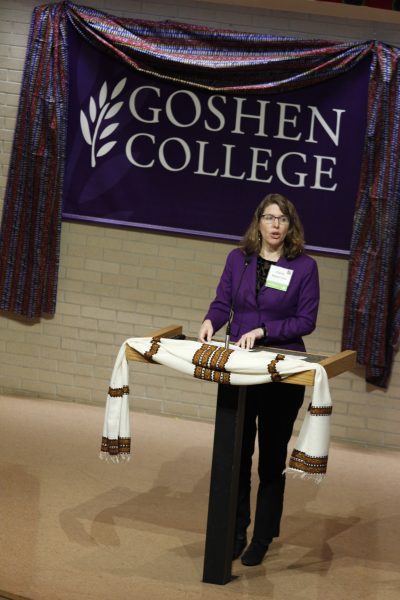A plenary lecture on Tuesday evening by Elaine Meyer-Lee, associate vice president for global learning and leadership development at Agnes Scott College, marked the opening of a two-day global education conference at Goshen College. The lecture took place in the Church-Chapel.
Meyer-Lee works with the SUMMIT program at Agnes Scott College to prepare students to thrive in a global community through a curriculum based in global learning and leadership development. Meyer-Lee is also a former Goshen student and traveled to Haiti on SST in 1984.
The conference, which ran from March 5-6 and was entitled “Global Education for All: Renewing Our Vision,” sought to examine the future of GC’s Study-Service Term (SST) program, which has been running for 50 years. Participants of the conference considered the past of the program while looking ahead, through a series of speakers and workshops.
Meyer-Lee’s lecture, entitled “The Value and Pedagogy of Global Learning for 21st Century Students,” was preceded by a performance by Voices of the Earth, formerly Women’s World Music Choir.
The choir sang “Baba ni Mungu,” a traditional Tanzanian song that was brought back by a student from SST. President Rebecca Stoltzfus then delivered a short welcome and introduced Meyer-Lee.
Meyer-Lee’s lecture was divided into five major parts: “My experience,” “National trends,” “Global learning outcomes,” “Why global learning matters” and “Goshen in a National context.”
Meyer-Lee, speaking with context from her current institution, Agnes Scott College, discussed the value of study abroad programs and other global education experiences, noting such benefits as increased critical self-awareness, the value in placing a discipline in another culture context and advantages in entering the workforce.
“Global education can improve attitudes toward other cultures,” Meyer-Lee said.
The lecture put Goshen College’s program into a national context, noting that while SST was wholly innovative when it was created in 1969, many of its defining characteristics are no longer entirely unique. Meyer-Lee noted, for example, that numerous institutions across the country now require an international education experience.
However, Meyer-Lee commended GC for the work to renew SST. “The program is very, very well aligned with the college’s mission and identity,” she said. “I am thrilled at Goshen’s commitment to their very own distinctive vision.”
Meyer-Lee also spoke about steps Agnes Scott College has taken to address needs of a diverse student body, and suggestions for other institutions.
“Fully attending to diversity, inclusion and equity is a long journey,” Meyer-Lee said.
Meyer-Lee concluded her talk by opening the discussion to questions and comments from the audience. Concerns included how to respond to risks, how a changing culture around study abroad affects faith development and whether Goshen College should remain committed to faculty leaders.
“This idea of a unified program with multiple pathways to the same outcomes has a whole lot of merit,” said Meyer-Lee, referring to Goshen’s proposed alterations to the global education program.
Following Meyer-Lee’s lecture, Tom Meyers, director of international education, took to the podium to honor in-country correspondents and former leaders. Representatives from two of the 24 countries SST has operated in, China and Tanzania, were at the lecture, and stood to be recognized. Former leaders who were in the audience also stood to be recognized.
Meyers also honored Hank Weaver and Arlyn Hunsberger, who were instrumental to the SST program’s inception. Meyers was recognized for his contributions as director of international education.
Marcia Yost, director of the arts at Goshen College, led the audience in a closing hymn, “To go to heaven,” a tune originating from Tanzania.
The lecture was immediately followed by a reception in the Fellowship Hall of the Church-Chapel to recognize former SST directors and leaders. The reception also honored Meyers, who will be retiring from his role as international education director at the end of the school year.
Following a day full of panels, lectures and collaboration, the campus SST conference concluded Wednesday evening with a plenary address by Ron Krabill, associate professor in the School of Interdisciplinary Arts & Sciences at the University of Washington Bothell and affiliate faculty with the Center for Communication, Difference and Equity and the Center for Human Rights at the University of Washington.
This address, entitled “Universal Design, Radical Reciprocity and Global Citizenship” took place in the Umble Center. A graduate of Goshen College and a former SST participant, Krabill spoke on inclusion in global education.



